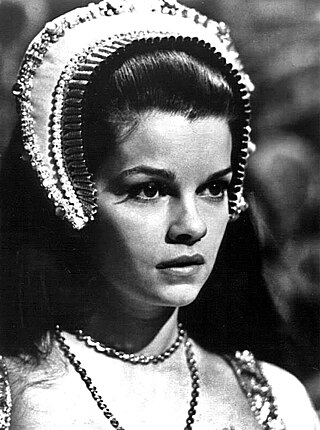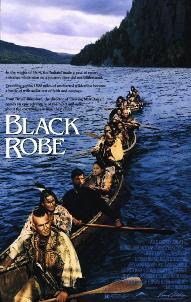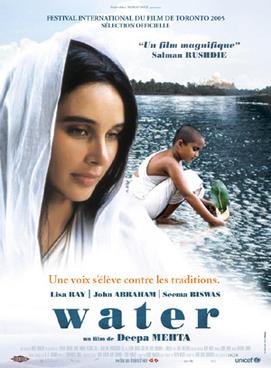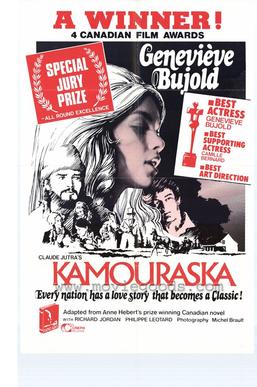Related Research Articles

Geneviève Bujold is a Canadian actress. For her portrayal of Anne Boleyn in the period drama film Anne of the Thousand Days (1969), Bujold received a nomination for the Academy Award for Best Actress. Her other film credits include The Trojan Women (1971), Earthquake (1974), Obsession (1976), Coma (1978), Murder by Decree (1979), Tightrope (1984), Choose Me (1984), Dead Ringers (1988), The House of Yes (1997), and Still Mine (2012).

Deepa Mehta, is an Indian-born Canadian film director and screenwriter, best known for her Elements Trilogy, Fire (1996), Earth (1998), and Water (2005).

Alanis Obomsawin, is an Abenaki American-Canadian filmmaker, singer, artist, and activist primarily known for her documentary films. Born in New Hampshire, United States and raised primarily in Quebec, Canada, she has written and directed many National Film Board of Canada documentaries on First Nations issues. Obomsawin is a member of Film Fatales independent women filmmakers.

Paul Almond was a Canadian television and motion picture screenwriter, director, producer, and novelist. He is most known for being the director of the first film in the Up series.

Black Robe is a 1991 historical drama film directed by Bruce Beresford, adapted by Brian Moore from his 1985 novel of the same name. Set in the 17th century, it depicts the adventures of a Jesuit missionary tasked with founding a mission in New France. To do so, he must traverse 1500 miles of harsh wilderness with the help of a group of Algonquins, facing danger from both the unfamiliar environment and rival tribes. The title refers to the nickname given to the Jesuits by the Algonquins, referring to his black cassock.
The Canadian Film Awards were the leading Canadian cinema awards from 1949 until 1978. These honours were conducted annually, except in 1974 when a number of Quebec directors withdrew their participation and prompted a cancellation. In the 1970s they were also sometimes known as the Etrog Awards for sculptor Sorel Etrog, who designed the statuette.

Water is a 2005 comedy drama and thriller film written and directed by Deepa Mehta, with screenplay by Anurag Kashyap. It is set in 1938 and explores the lives of widows at an ashram in India. The film is also the third and final installment of Mehta's Elements trilogy. It was preceded by Fire (1996) and Earth (1998). Author Bapsi Sidhwa wrote the 2006 novel based upon the film, Water: A Novel, published by Milkweed Press. Sidhwa's earlier novel, Cracking India was the basis for Earth, the second film in the trilogy.
Léa Pool C.M. is a Canadian and Swiss filmmaker who taught film at the Université du Québec à Montréal. She has directed several documentaries and feature films, many of which have won significant awards including the Prize of the Ecumenical Jury, and she was the first woman to win the prize for Best Film at the Quebec Cinema Awards. Pool's films often opposed stereotypes and refused to focus on heterosexual relations, preferring individuality.
Amanita Pestilens is a 1963 Canadian-American psychological horror-fantasy/drama film produced by F. R. Crawley, and directed by René Bonnière. It was "the first Canadian feature film to be shot in both English and French with the same set of actors". It included an early career performance by Geneviève Bujold, along with performances by Jacques Labrecque and Huguette Oligny. This was the first Canadian feature film to be produced in colour. It was filmed at Harrington Lake, Québec.

Kamouraska is a 1973 French-Canadian film directed and written by Claude Jutra, based on the 1970 novel of the same name by Anne Hébert. At the time of its release it was the most expensive film ever made in Canadian history. It won four Canadian Film Awards, but was unsuccessful at the box office.

Pour la suite du monde is a 1963 Canadian documentary film produced by the National Film Board of Canada and directed by Michel Brault, Marcel Carrière and Pierre Perrault. It is the first of Perrault's Isle-aux-Coudres Trilogy: Le règne du jour followed in 1967, Les voitures d'eau in 1968.
Between Salt and Sweet Water, also known as Drifting Upstream, is a 1967 Québécois film directed by Michel Brault, co-written by Brault, Gérald Godin, Marcel Dubé, Claude Jutra and Denys Arcand.

Isabel is a 1968 Canadian film written, directed and produced by Paul Almond.
The Act of the Heart is a 1970 Canadian drama film written, directed and produced by Paul Almond, and starring Geneviève Bujold, Donald Sutherland, Monique Leyrac and Sharon Acker.
Final Assignment is a 1980 Canadian thriller drama film, written by Marc Rosen and directed by Paul Almond.
My Friend Max is a 1994 Canadian drama film, written by Guy Fournier and Jefferson Lewis, and directed by Michel Brault. The film premiered in February 1994 at the Rendez-vous du cinéma québécois.
The Paper Wedding is a 1989 made for television Canadian film directed by Michel Brault. It was entered into the 40th Berlin International Film Festival.
Tracey Penelope Tekahentakwa Deer is a Canadian screenwriter, film director and newspaper publisher based in Kahnawake, Quebec. She has written and directed several award-winning documentaries for Rezolution Pictures, an Aboriginal-run film and television production company. In 2008, she was the first Mohawk woman to win a Gemini Award, for her documentary Club Native. Her TV series Mohawk Girls had five seasons from 2014 to 2017. She also founded her own production company for independent short work.
Sophie Deraspe is a Canadian director, scenarist, director of photography and producer. Prominent in new Quebec cinema, she is known for a 2015 documentary The Amina Profile, an exploration of the Amina Abdallah Arraf al Omari hoax of 2011. She had previously written and directed the narrative feature films Missing Victor Pellerin in 2006, Vital Signs in 2009, The Wolves in 2015,
Josée Deschênes is a Canadian actress from Quebec. She is most noted for her performances in the films Polygraph, for which she was a Genie Award nominee for Best Supporting Actress at the 17th Genie Awards in 1996, and Ghost Town Anthology , for which she was a Prix Iris nominee for Best Actress at the 21st Quebec Cinema Awards in 2019.
References
- ↑ "Journey". Film Reference Library. 2003. Archived from the original on 2009-02-26. Retrieved 2009-10-21.
- ↑ Corcelli, John (August 2005). "Canadian Cinema". Canadian Communications Foundation. Archived from the original on 6 July 2011. Retrieved 7 May 2010.